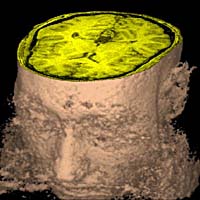Exploring Your Brain: Stress, Trauma, and the Brain
The "flight or fight" response originates from the sympathetic portion of the nervous system. During a highly stressful situation, such as possible physical harm to ones self and others, or even when it is psychological in nature, the sympathetic nervous system simulates glands of the endocrine system, most notably the adrenal gland. Once stimulated, it secretes the hormone epinephrine, commonly known as adrenaline. This hormone acts upon the somatic nervous system, changing emotional behavior and stress reactions such as muscles being stronger and reactions being quicker.
The effects of adrenaline and cortisol are significant. Adrenaline and cortisol are secreted from the adrenal glands in stressful situations. When cortisol is secreted, it causes a breakdown of muscle protein, leading to the release of amino acids (the "building blocks" of protein) into the bloodstream. These amino acids are then used by the liver to synthesize glucose for energy, in a process called gluconeogenesis. This process raises the blood sugar level so the brain will have more glucose for energy. At the same time the other tissues of the body decrease their use of glucose as fuel. Cortisol also leads to the release of so-called fatty acids, an energy source from fat cells, for use by the muscles.
The Romanian Orphans: The Stress of No Affection
In 1994, scientests conducted an experiment on 60 Romanian babies, measuring their cortisol levels to see its affect on their development. Orphaned due to the repercussions of war, they were given refuge in a hospital that was poorly staffed, though one should understand that hospitals cannot be orphanages and orphanages cannot be hospitals. Nevertheless, the staff of nurses could not devote enough time to the babies to make up for the lack of motherly attention they desperately needed. Isolated, alone, and seen only to provide their basic needs, the babies were relatively devoid of attention and empty of love. Without these necessities, something frightful occurred--the babies ceased maturing. They ceased to develop, stunted both physically, emotionally and psychologically as a result of their high cortisol levels.Their life span was significantly shorter than the average human being, so one must consider whether love should be recognized as being equally important as food, shelter and water to a human being's well being.
Predisposition to Stress
Some of us are more prone to stress because there are a lot of us who are alone. Social isolation is the culprit that leaves some more prone to the debilitating effects of stress. The reason that social isolation is so bad is because it is a constant stressor. In flight or fight situations the cortisol that is released eventually stops being released, because the stressor is gone. An example of this would be when a gazelle finally tires out a cheetah and manages to find safety again. The stressor is gone, and soon is the cortisol. With social isolation, the stress is continuos, constantly releasing cortisol and when cortisol is in the system for a prolonged period of time it has severe negative effects. Some of these affects are increase in blood sugar which in turn stimulates the production of excess insulin (excess insulin leads to body cell destruction and excess fat storage). It also depresses immune functioning, leading to frequent or prolonged sickness. It causes loss of muscle mass, decreases bone density, impairs wound healing, slows thyroid functioning, increases and prolongs appetite, encourages fat storage in the abdomen that may be associated with serious chronic health concerns. It interferes with reproductive functioning as well, not to mention creating feelings of anxiety. It also encourages depression and promotes feelings of anger and frustration.


0 Comments:
Post a Comment
<< Home